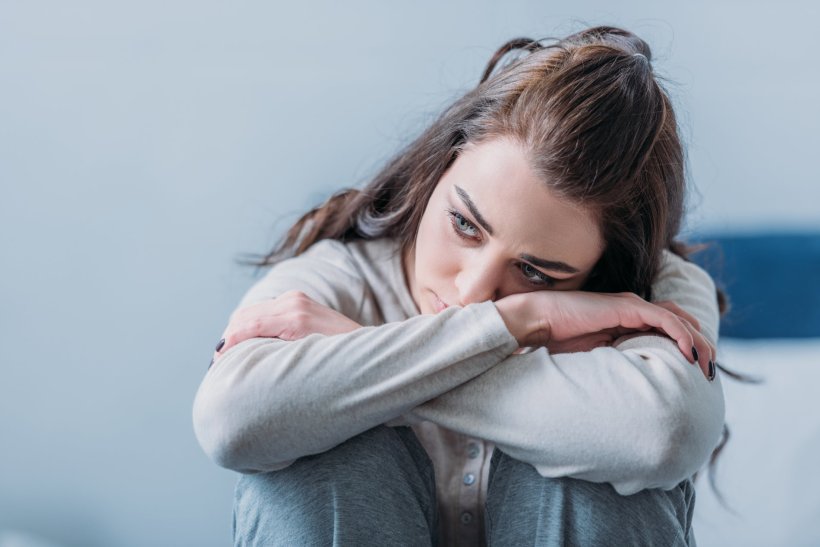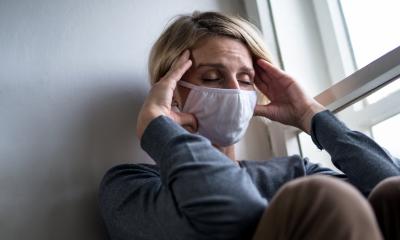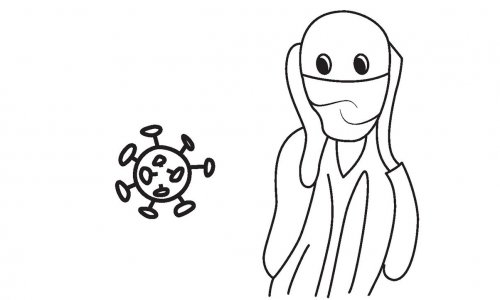
Image source: Adobe Stock/LIGHTFIELD STUDIOS
News • Coronavirus after-effects
Severe Covid-19 linked to increased anxiety and depression risk
People who were bedridden for at least a week due to Covid-19 were more likely to experience anxiety and depression for up to 16 months after the infection, compared with those who only had mild symptoms or were never infected.
That is according to a large study based on data from six countries and conducted by an international team of researchers including those from Karolinska Institutet and the University of Iceland. The findings are published in The Lancet Public Health.

Image source: Karolinska Institutet; photo: private
“Our results indicate that the long-term mental health of recovering Covid-19 patients may be affected by the severity of the acute infection,” says Anikó Lovik, postdoctoral researcher at the Institute of Environmental Medicine at Karolinska Institutet and one of the study’s first authors. “While we cannot fully explain these associations, some contributing factors may be a combination of worrying about long-term health effects as well as persistence of physical symptoms that limit social contact and fuel a sense of helplessness. It is also possible that severe Covid-19 triggers inflammatory processes that have previously been linked to increased risk of mental ill-health.”
The study is among the first to examine long-term mental health symptoms in the general population after Covid-19 infection. Prior research has mostly focused on mental health in hospitalized Covid-19 patients and had shorter follow-up after diagnosis. The current study included almost 250,000 people from Sweden, Iceland, Denmark, Estonia, Norway and the U.K., including nearly 10,000 who were diagnosed with Covid-19. The participants were asked to self-rate symptoms of depression, anxiety, poor sleep quality and Covid-related distress as well as how long they were bedridden due to Covid-19, over a period of up to 16 months. From Sweden, more than 23,000 people participated through the so-called Omtanke2020 study.

Image source: Karolinska Institutet; photo: Ulf Sirborn
The results show that people with confirmed Covid-19 were slightly more likely to report signs of depression and poor sleep quality compared with those never infected, but that symptoms generally eased over time. However, the prevalence of symptoms varied greatly depending on the severity of the acute infection. Compared with those not diagnosed, the prevalence of anxiety and depression was consistently lower for those who had only mild or no symptoms, but around 40-60 percent higher for those who were bedridden for a week or more (which was the case for about a quarter of those diagnosed). The association remained throughout the 16-month study period. “It is possible that the completion of low- or asymptomatic Covid-19 infection results in a certain relief among these individuals who can now return to their normal lives,” says Fang Fang, professor at the Institute of Environmental Medicine at Karolinska Institutet, and one of the study’s senior authors. “This could be one of the reasons for the lower prevalence of mental health symptoms observed in this group relative to those in the population who are still worried about being infected and therefore avoiding social interactions.”
The researchers note that the study cannot establish causality and that it is possible that underlying factors beyond those considered could influence the association. They also note some limitations, including that individuals diagnosed with Covid-19 were marginally more likely to have past diagnoses of psychiatric disorders than those never infected, and that people diagnosed with Covid-19 were on average younger than those not diagnosed. Even though the researchers account for these differences in the analysis, some residual confounders may be at play.
Taken together, the results underscore the need for more research and clinical vigilance of adverse mental health symptoms among patients most severely affected during the acute phase of Covid-19.
16.03.2022











